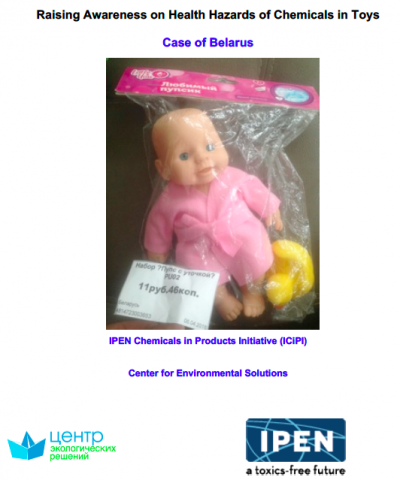Raising Awareness on Health Hazards of Chemicals in Toys- Belarus

In 2018, Center for Environmental Solutions studied labels and content of 29 plastic toys and children-related products from 12 sales points in Minsk, Belarus. All these products can be easily purchased by consumers in supermarkets, stores, and open markets.
Out of 29 purchased items, 27 toys were tested for concentration of toxic metals and bromine, using XRF-method at Arnika Association in the Czech Republic.
Another 2 toys were tested for phthalates in the Greenpeace Laboratories (UK) and Eurofins Consumer Product Testing (Germany).
The project helped raise the issue of challenges with access of public to information about chemicals in products, and pointed out the concrete lack of information for the public on toys’ labels. However, a lot needs to be done to implement the SAICM objectives in this area in Belarus. CES' recommendations for the next steps include:
- Ensure mandatory information disclosure of chemicals in consumer products, especially products for children and toys. Disclosure of information for cosmetic products could be used as a good practice example;
- Strengthen regular chemical control of toys produced in Belarus and imported to Belarus;
- Strengthen public awareness-raising campaign about chemicals in products and ways to minimize negative health and environmental impacts;
- Use the case of chemicals in products and the importance of providing information to consumers as an important step towards the implementation of Sustainable Development Goals (SDGs) in Belarus;
- Continuation of efforts to ban hazardous phthalates (to add to the existing list); certification procedures have to be strictly followed so that the banned/ restricted phthalates, which are not banned/restricted in the country of origin, do not enter the national market;
- Strengthening capacities of civil society representatives (active citizen groups, NGOs, internet communities, mass media) to protect consumers’ right to information and to demand information disclosure on hazardous chemicals in products (special attention to be paid to the need to have information in the national language);
- Continued experience sharing of the lessons learned by NGOs engaged in similar efforts at the EECCA level.
This project relates to Sustainable Development Goals 3 & 12.
Special thanks to IPEN's Central & Eastern Europe Regional Coordinator Jan Samanek and Regional Hub Arnika for their important contributions to the development and finalization of the project.
| Attachment | Size |
|---|---|
| 1.13 MB |
